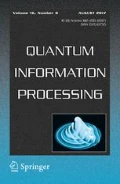Abstract
This study explores a new security problem existing in various state-of-the-art quantum private comparison (QPC) protocols, where a malicious third-party (TP) announces fake comparison (or intermediate) results. In this case, the participants could eventually be led to a wrong direction and the QPC will become fraudulent. In order to resolve this problem, a new QPC protocol is proposed, where a second TP is introduced to monitor the first one. Once a TP announces a fake comparison (or intermediate) result, participants can detect the fraud immediately. Besides, due to the introduction of the second TP, the proposed protocol allows strangers to compare their secrets privately, whereas the state-of-the-art QPCs require the involved clients to know each other before running the protocol.

Similar content being viewed by others
References
Yang, Y.-G., Wen, Q.-Y.: An efficient two-party quantum private comparison protocol with decoy photons and two-photon entanglement. J. Phys. A Math. Theor. 42(5), 055305 (2009). http://stacks.iop.org/1751-8121/42/i=5/a=055305
Deng, F.-G., Li, X.-H., Zhou, H.-Y., Zhang, Z.-j.: Improving the security of multiparty quantum secret sharing against trojan horse attack. Phys. Rev. A 72, 044302 (2005). http://link.aps.org/doi/10.1103/PhysRevA.72.044302
Cai, Q.-Y.: Eavesdropping on the two-way quantum communication protocols with invisible photons. Phys. Lett. A 351(1), 23–25 (2006). http://www.sciencedirect.com/science/article/pii/S0375960105016208
Li, X.-H., Deng, F.-G., Zhou, H.-Y.: Improving the security of secure direct communication based on the secret transmitting order of particles. Phys. Rev. A 74, 054302 (2006). http://link.aps.org/doi/10.1103/PhysRevA.74.054302
Chen, X.-B., Xu, G., Niu, X.-X., Wen, Q.-Y., Yang, Y.-X.: An efficient protocol for the private comparison of equal information based on the triplet entangled state and single-particle measurement. Opt. Commun. 283(7), 1561–1565 (2010). http://www.sciencedirect.com/science/article/pii/S0030401809012668
Liu, W., Wang, Y.-B.: Quantum private comparison based on GHZ entangled states. Int. J. Theor. Phys. 51(11), 3596–3604 (2012). doi:10.1007/s10773-012-1246-z
Wen, L., Yong-Bin, W., Wei, C.: Quantum private comparison protocol based on bell entangled states. Commun. Theor. Phys. 57(4), 583 (2012). http://stacks.iop.org/0253-6102/57/i=4/a=11
Liu, W., Wang, Y.-B., Jiang, Z.-T.: An efficient protocol for the quantum private comparison of equality with w state. Opt. Commun. 284(12), 3160–3163 (2011). http://www.sciencedirect.com/science/article/pii/S0030401811001842
Liu, W., Wang, Y.-B., Jiang, Z.-T., Cao, Y.-Z.: A protocol for the quantum private comparison of equality with \(\chi \)-type state. Int. J. Theor. Phys. 51(1), 69–77 (2012). doi:10.1007/s10773-011-0878-8
Liu, W., Wang, Y.-B., Jiang, Z.-T., Cao, Y.-Z., Cui, W.: New quantum private comparison protocol using \(\chi \) type state. Int. J. Theor. Phys. 51(6), 1953–1960 (2012). doi:10.1007/s10773-011-1073-7
Tseng, H.-Y., Lin, J., Hwang, T.: New quantum private comparison protocol using epr pairs. Quantum Inf. Process. 11(2), 373–384 (2012). doi:10.1007/s11128-011-0251-0
Chang, Y.-J., Tsai, C.-W., Hwang, T.: Multi-user private comparison protocol using ghz class states. Quantum Inf. Process. 12(2), 1077–1088 (2013). doi:10.1007/s11128-012-0454-z
Liu, W., Wang, Y.-B., Wang, X.-M.: Multi-party quantum private comparison protocol using d-dimensional basis states without entanglement swapping. Int. J. Theor. Phys. 53(4), 1085–1091 (2014). doi:10.1007/s10773-013-1903-x
Zhang, W.-W., Zhang, K.-J.: Cryptanalysis and improvement of the quantum private comparison protocol with semi-honest third party. Quantum Inf. Process. 12(5), 1981–1990 (2013). doi:10.1007/s11128-012-0507-3
Lo, H.-K.: Insecurity of quantum secure computations. Phys. Rev. A 56(2), 1154–1162 (1997). http://link.aps.org/doi/10.1103/PhysRevA.56.115420
Huang, S.-L., Hwang, T., Gope, P.: Multi-party quantum private comparison with an almost-dishonest third party. Quantum Inf. Process. 14(11), 4225–4235 (2015). doi:10.1007/s11128-015-1104-z
Chang, C.-H., Hwang, T., Gope, P.: An efficient quantum private comparison of equality over collective-noise channels. Int. J. Theor. Phys. 55(4), 2125–2138 (2016). doi:10.1007/s10773-015-2851-4
Huang, S.-L., Hwang, T., Gope, P.: Multi-party quantum private comparison protocol with an almost-dishonest third party using ghz states. Int. J. Theor. Phys. 55(6), 2969–2976 (2016). doi:10.1007/s10773-016-2929-7
Long, G.L., Liu, X.S.: Theoretically efficient high-capacity quantum-key-distribution scheme. Phys. Rev. A 65(3), 032302 (2002)
Kim, B., Felbinger, T.: Deterministic secure direct communication using entanglement. Phys. Rev. Lett. 89(18), 187902 (2002)
Luo, Y.-P., Hwang, T.: Arbitrated quantum signature of classical messages without using authenticated classical channels. Quantum Inf. Process. 13(1), 113–120 (2014). doi:10.1007/s11128-013-0634-5
Sun, Z., Yu, J., Wang, P., Xu, L., Wu, C.: Quantum private comparison with a malicious third party. Quantum Inf. Process. 14(6), 2125–2133 (2015)
Gao, F., Guo, F.-Z., Wen, Q.-Y., Zhu, F.-C.: Comment on “experimental demonstration of a quantum protocol for byzantine agreement and liar detection”. Phys. Rev. Lett. 101, 208901 (2008). http://link.aps.org/doi/10.1103/PhysRevLett.101.208901
Fei, G., Song, L., Qiao-Yan, W., Fu-Chen, Z.: A special eavesdropping on one-sender versus n-receiver QSDC protocol. Chin. Phys. Lett. 25(5), 1561 (2008). http://stacks.iop.org/0256-307X/25/i=5/a=011
Gao, F., Qin, S.-J., Wen, Q.-Y., Zhu, F.-C.: A simple participant attack on the brádler-dušek protocol. Quantum Inf. Comput. 7(4), 329–334 (2007). http://dl.acm.org/citation.cfm?id=2011725.2011729
Acknowledgements
We would like to thank the Ministry of Science and Technology of Republic of China for financial support of this research under Contract No. MOST 104-2221-E-006-102. The authors would like to thank the anonymous reviewers for their valuable comments to improve the quality of this paper.
Author information
Authors and Affiliations
Corresponding author
Rights and permissions
About this article
Cite this article
Hung, SM., Hwang, SL., Hwang, T. et al. Multiparty quantum private comparison with almost dishonest third parties for strangers. Quantum Inf Process 16, 36 (2017). https://doi.org/10.1007/s11128-016-1498-2
Received:
Accepted:
Published:
DOI: https://doi.org/10.1007/s11128-016-1498-2



